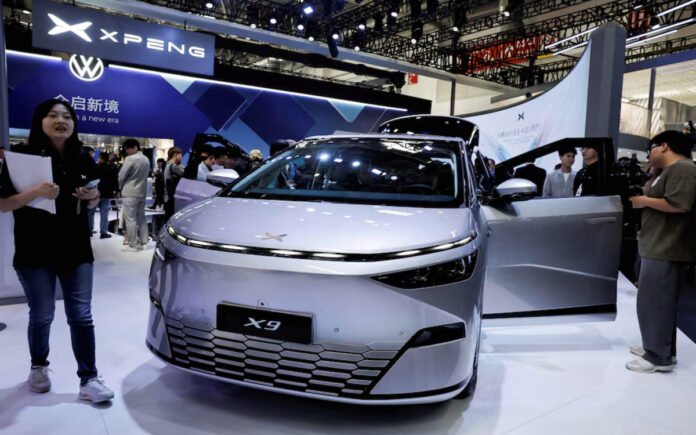Beijing: If Tesla can successfully introduce its “Full Self-Driving” (FSD) system into China, the world’s largest automobile market, it will position itself at the forefront of the global race toward autonomous vehicles.
During a whirlwind visit to Beijing commencing Sunday, Elon Musk arrived to explore the potential launch of Tesla’s FSD driver-assistance system and the prospect of securing governmental approvals for the international transfer of data from Tesla vehicles in China, as disclosed by a knowledgeable source.
This data, utilized for training self-driving systems, would significantly advance Tesla’s ongoing endeavors to develop fully autonomous vehicles.
Similar to its strides in electric cars, Tesla could emerge as a formidable contender in China’s autonomous vehicle sector, according to industry analysts and executives, citing its early strides in developing driver-assistance systems equipped with autonomous features.
However, Tesla confronts formidable adversaries such as BYD, China’s leading EV manufacturer, and Huawei, a smartphone giant evolving into a national technological powerhouse, both of which have introduced systems tailored to navigate China’s densely populated urban landscapes.
These two industry behemoths are among a cohort of at least ten automakers and suppliers that have unveiled driver-assistance systems over the past two years, capable of traversing city streets and executing turns at intersections. Other contenders include EV manufacturers Xpeng and Li Auto, along with Xiaomi, the smartphone manufacturer that recently debuted its first car to widespread acclaim.
Also Read | Musk Initiates Fresh Job Cuts: Tesla Senior Executives Laid Off
Maxwell Zhou, co-founder of DeepRoute.ai, a China-based startup specializing in advanced driver-assistance systems software, emphasized the necessity for any new model priced above $30,000 in China to incorporate advanced driver-assistance features to remain competitive. “You must have a high-level driving solution to prove you have a smart car, not a stupid car,” Zhou asserted in an interview with Reuters.
Xpeng has announced intentions to launch a new mass-market brand, Mona, featuring self-driving capabilities on a vehicle priced below $21,000, undercutting Tesla’s Model 3 in China by over $10,000.
While many industry experts anticipate that fully autonomous cars will not become ubiquitous for several years, predictions vary considerably. Presently, driver-assistance features available in China constitute “level two” systems, necessitating a vigilant driver prepared to assume control. Tesla’s FSD and its less advanced Autopilot options also fall under this category, requiring attentive drivers.
Baidu, China’s premier search engine operator, and Pony.ai, an autonomous driving startup, operate more fully automated vehicle fleets in limited test zones.
Tesla’s endeavor to roll out FSD in China could catalyze other EV startups to accelerate their research and development efforts, remarked Yale Zhang, managing director at Shanghai-based consultancy Automotive Foresight, drawing parallels to the “catfish effect” witnessed in China’s electric vehicle development following Tesla’s approval to establish a Shanghai plant in 2018.
At the Beijing auto show held last week, Chinese automakers and suppliers showcased “level-two-plus” driver-assistance systems boasting advanced sensors and displays. Although not yet approved by regulators for hands-off-the-wheel driving, some are designed to accommodate future software updates.
While Tesla relies solely on cameras to detect hazards around self-driving vehicles, other automakers are introducing systems incorporating lidar, which employs pulses of light to identify objects. Huawei showcased components including telematics receivers compatible with both the U.S.-supported GPS system and China’s BeiDou satellite system, along with lidar and optical sensors, for advanced driving systems.
Markus Heyn, board member overseeing the mobility unit at Bosch, a major German auto supplier, welcomed the competition from companies like Huawei, emphasizing the benefits of innovation and disruption.
Tesla stands as a formidable contender, partly due to its capacity to amass data from its vehicles, comprising the world’s largest fleet of EVs currently traversing roads. However, under Beijing’s data security regulations, Tesla cannot transfer data from its Chinese cars offshore without approvals.
Elon Musk has advocated for the accessibility of this data for training its self-driving technology beyond China, as reported by individuals familiar with Musk’s discussions with Chinese officials. The progress, if any, made by Musk regarding data transfers with Chinese officials he met in Beijing, including Premier Li Qiang, remains undisclosed.
Despite any hurdles, Musk departed China with indications that Tesla is nearing the delivery of FSD in China, potentially unlocking a new revenue stream amidst intense pressure on its EV sales and pricing from Chinese rivals.
Noteworthy victories for Tesla during the trip included an endorsement from China’s auto industry group affirming compliance of Tesla’s top-selling models with China’s data privacy regulations, and the announcement of a partnership with Baidu permitting Tesla to utilize its mapping license for data collection.
Xpeng Motors CEO He Xiaopeng predicted that Tesla’s prospective launch of FSD in China could escalate the decade-long battle for dominance in “smart EVs,” emphasizing the imperative for China’s self-driving technology industry to expand its influence beyond domestic borders.



